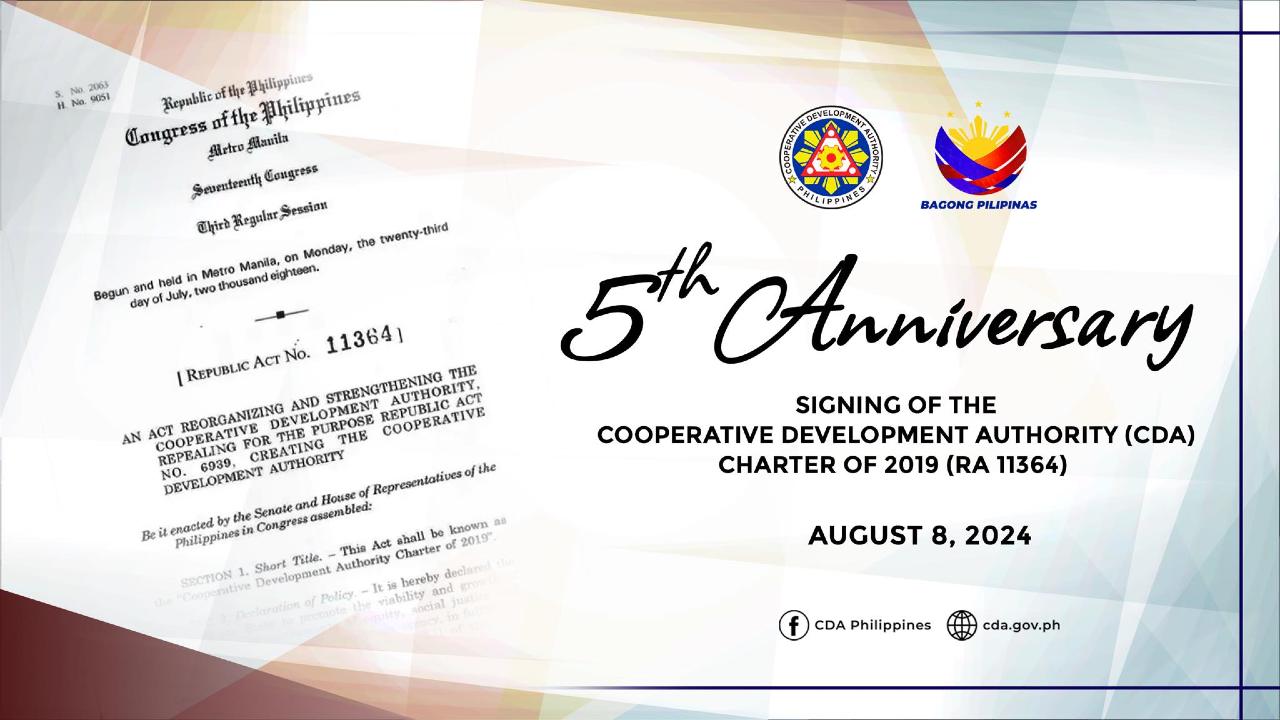The Cooperative Development Authority (CDA) is a Philippine government agency focused on promoting and sustaining cooperatives or co-ops in the country. Established under Republic Act (RA) No. 6939 and restructured by RA No. 11364, the CDA operates under the Department of Trade and Industry to enhance cooperatives as tools for social justice and economic growth.
The CDA provides regulatory oversight, technical assistance, and capacity-building programs to cooperatives across various sectors. By facilitating access to funds and financial aid and fostering community development, the CDA ensures cooperatives can effectively serve their members and contribute to the country’s socio-economic progress.
What does CDA stand for?
The CDA stands for the Cooperative Development Authority, a government agency dedicated to promoting the viability and growth of cooperatives. Established under RA No. 6939 and later restructured with the passage of Republic Act No. 11364,, the CDA operates under the Department of Trade and Industry (DTI) ensuring that cooperative development remains as a means of achieving social justice and economic development. Through the CDA, cooperatives, though under the private sector, remain partners of the government in sustainable development and economic growth.
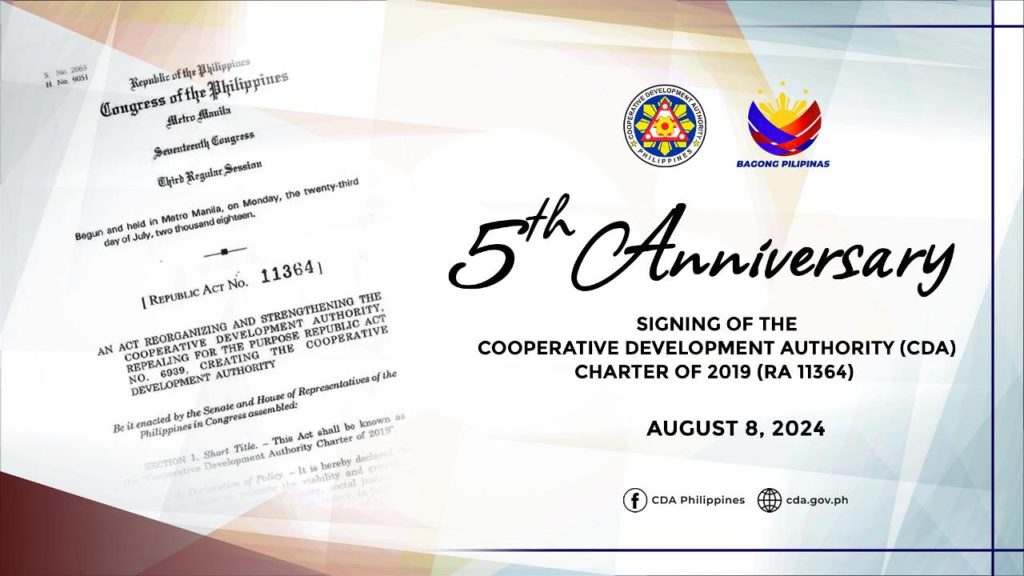
History
The history of the CDA traces back to 1915, with the enactment of the Rural Credit Cooperatives Association Act. For decades, various government bodies, including the National Cooperatives Administration and the Bureau of Cooperatives Development, were established to oversee cooperative activities. By 1987, the Philippine Constitution mandated the creation of an agency to promote cooperatives as instruments of social justice and economic development.
The turning point came in 1990, with the signing of RA 6938 and 6939, which formalized the Cooperative Code of the Philippines and the CDA Charter. Later, in 2019, the CDA Charter was further strengthened through RA 11364, which aimed to ensure the continued viability and growth of cooperatives across the nation.
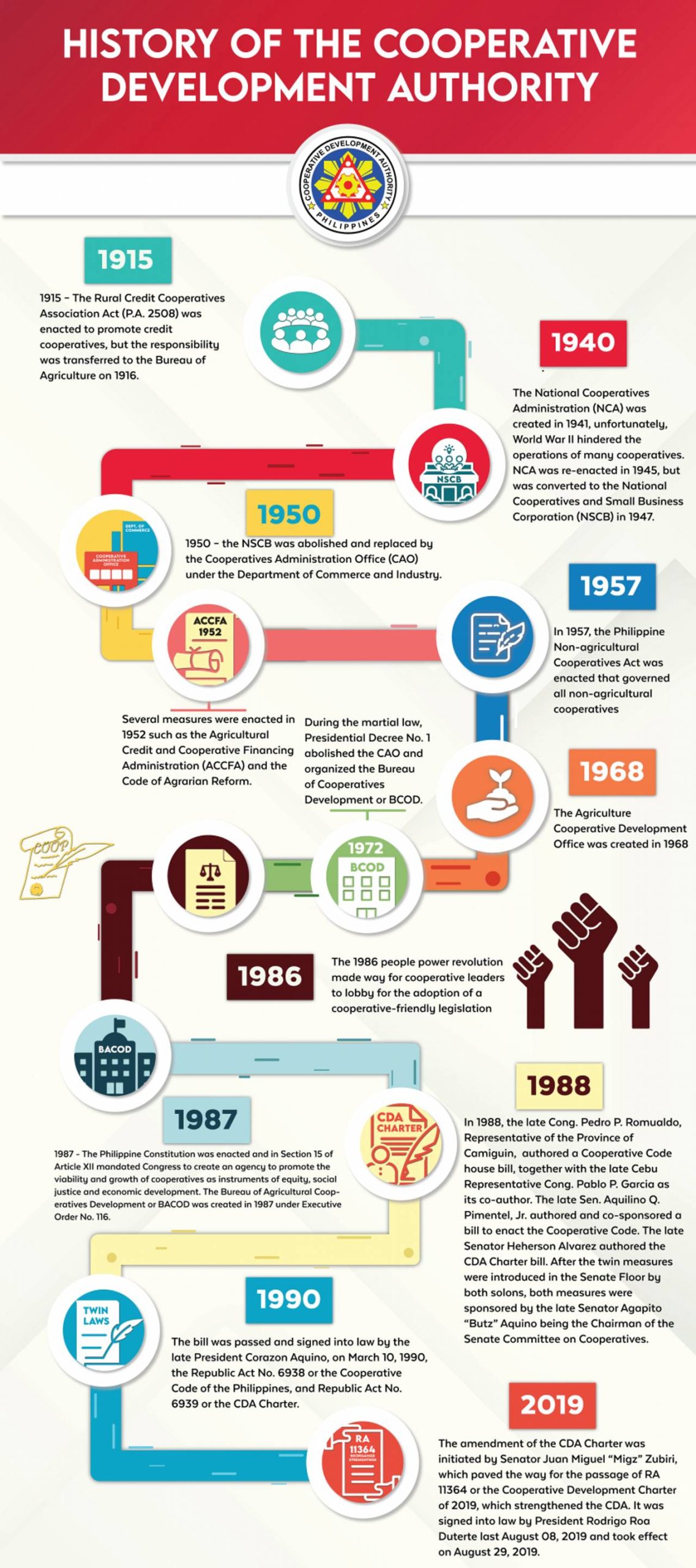
Logo
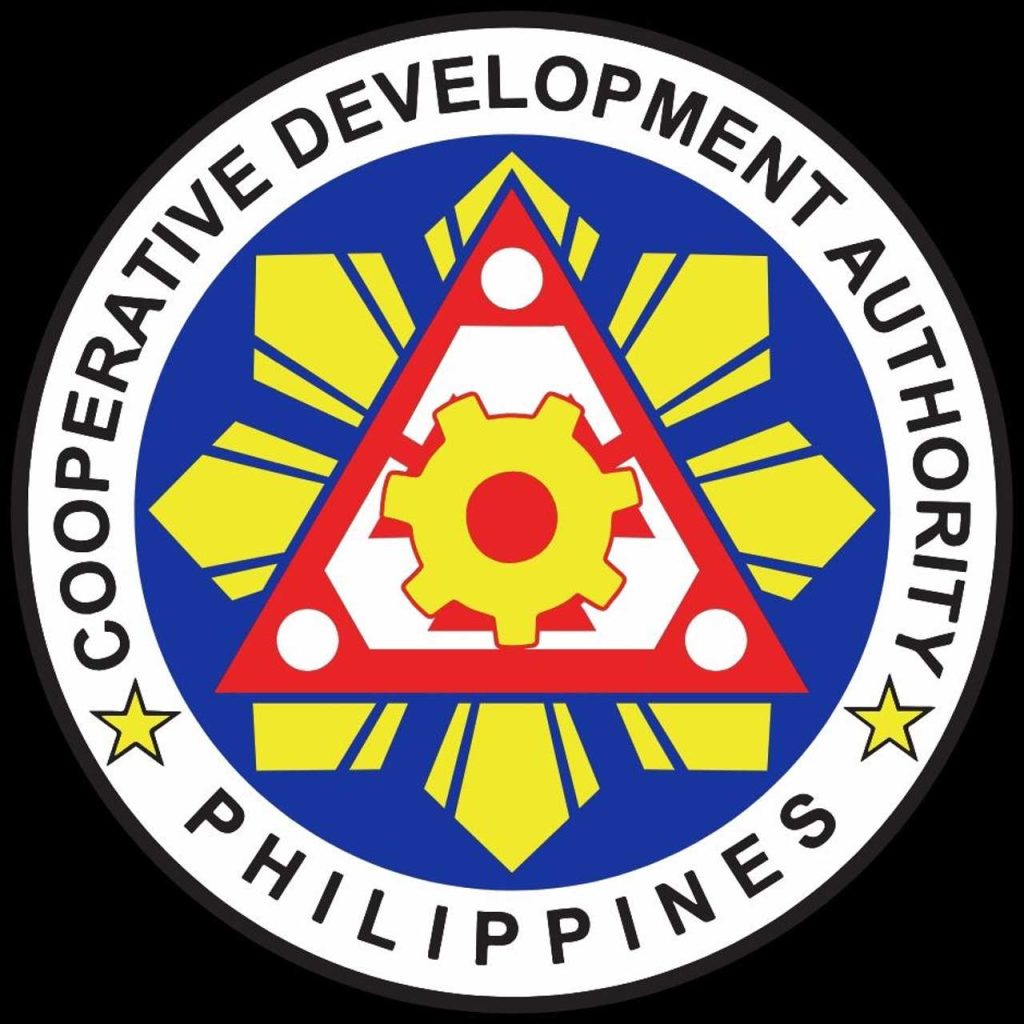
The CDA logo reflects its historical connection to the Office of the President, signifying the agency’s important role in promoting cooperatives as instruments of equity and economic development. The logo incorporates the following elements as well:
- Four colors of the Philippine flag, each symbolizing key national values: blue for justice and truth, red for courage and patriotism, white for fraternity and equality, and yellow for freedom and democracy.
- Three figures in a triangle, representing the cooperation between the public, private, and cooperative sectors.
- The seven cogs in the wheel represent the six cooperative clusters defined by RA 11364 and the CDA itself.
- The eight rays of the sun symbolize the principles of cooperative identity and subsidiari
Mission
“To ensure the safe and sound operations of cooperatives.”
Vision
“An effective and efficient regulatory agency working towards the development of viable, sustainable, socially responsive and globally competitive cooperatives.”
Core Values
These core values guide the CDA in fulfilling its mission to promote the growth and sustainability of cooperatives in the country.
- Excellence: Delivering top performance by managing resources effectively and efficiently.
- Commitment: Demonstrating strong dedication and proactive involvement in achieving the agency’s goals.
- Integrity: Upholding impeccable personal conduct.
- Teamwork: Collaborating harmoniously to create a productive environment that supports organizational objectives.
Quality Policy
The CDA Quality Policy serves as a framework for the agency’s operations, emphasizing its commitment to promoting the growth and development of cooperatives in the country. The policy outlines the following key principles:
- Customer Satisfaction: Enhancing customer satisfaction by delivering quality services that meet the needs and expectations of cooperatives and stakeholders.
- Continuous Improvement: The agency strives for continuous improvement in its processes and services, ensuring that it remains responsive and effective in its regulatory and developmental roles.
- Collaboration and Partnership: The CDA fosters collaboration with cooperatives, government agencies, and other stakeholders to create a supportive environment for cooperative development.
- Capacity Building: The policy highlights the importance of training and education for cooperative members and leaders to enhance their skills and knowledge.
- Transparency and Accountability: The CDA commits to maintaining transparency in its operations and being accountable to its stakeholders, ensuring trust and integrity in its dealings.
With these, the agency hopes to effectively support the cooperative sector in the Philippines.
Service Pledge
Both the officials and employees of the CDA show their commitment to public service and specifically pledge to:
- Serve citizens promptly, efficiently, and effectively with courtesy, ensuring that authorized personnel with proper identification are available from Mondays to Fridays without noon breaks.
- Adhere to established service standards, providing written explanations for any delays in frontline services.
- Offer comfortable waiting areas and ensure that frontline personnel are available to address clients’ queries immediately.
- Implement a feedback system to evaluate the quality of services provided and make necessary improvements.
- Address complaints regarding services as quickly as possible.
These pledges aim to enhance service delivery while promoting transparency, accountability, and quality service.
Mandate
The CDA strives to encourage the sustainability and growth of cooperatives as tools for promoting equity, social justice, and economic development, in line with the mandate outlined in Section 15, Article XII of the Constitution.
Powers and Functions
As stated on its revised charter, some of the CDA’s powers and functions are as follows:
- Develop appropriate regulations, standards, and guidelines for cooperative operations.
- Formulate and implement comprehensive plans for cooperative development consistent with national policies, establishing an integrated framework across government agencies.
- Register cooperatives, including amendments to their Articles of Cooperation and Bylaws, division, merger, and consolidation.
- Authorize the establishment of cooperative branches and satellite offices.
- Issue Certificates of Recognition to organized Laboratory Cooperatives.
- Exercise supervision over all registered cooperatives.
- Require annual reports, audited financial statements, and other necessary submissions.
- Promote the proper use of statutory funds to benefit cooperatives and their communities.
- Collect reasonable fees and charges for registration and regulatory functions.
- Require cooperatives to develop business continuity plans for risk management.
- Grant awards, recognition, and incentives to cooperatives, leaders, and partners.
- Order the dissolution, liquidation, and transfer of assets and liabilities of cooperatives.
- Compel general or representative assemblies for cooperatives under CDA supervision with cooperative federations or unions.
- Hear, decide, and resolve inter-cooperative and intra-cooperative disputes, with decisions appealable to the Court of Appeals.
- Exercise other powers necessary to implement Republic Acts No. 11364 and 9520.
Organizational Structure
The CDA has a structured organizational framework designed to effectively manage and promote cooperatives in the Philippines. Here’s how it looks like:
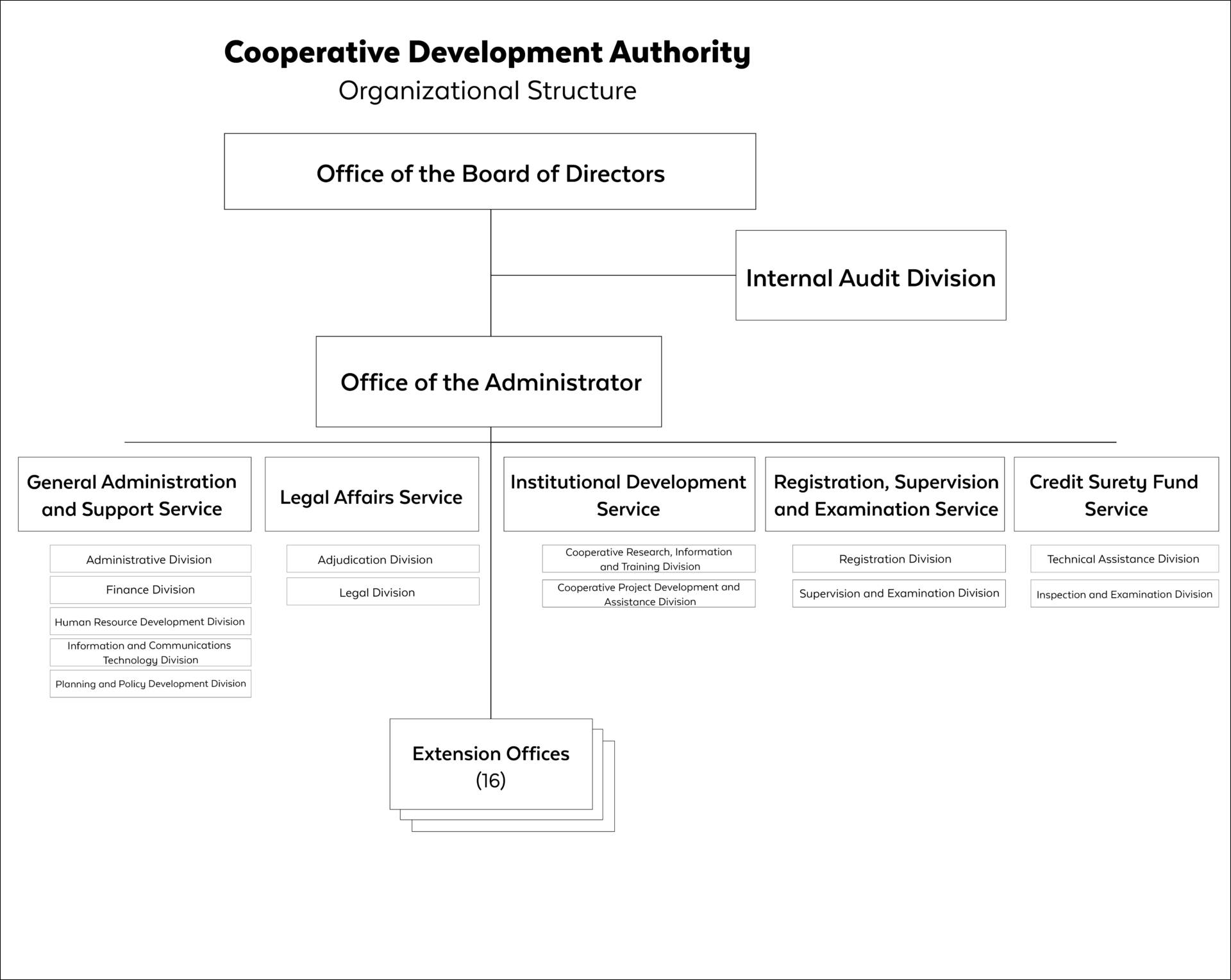
Board of Administrators
- Composition: The CDA is governed by a Chairperson, holding the rank of Undersecretary, and six members, each with the rank of Assistant Secretary. All are appointed by the President of the Philippines from nominees in the cooperative sector.
- Ex Officio Members: The Secretaries of the Department of Trade and Industry (DTI) and the ll0Department of the Interior and Local Government (DILG) serve as ex officio members.
Administration
- Administrator: The CDA is led by an Administrator, appointed by the President, who oversees the agency’s operations.
- Deputy Administrators: Five Deputy Administrators assist the Administrator, focusing on specific areas:
- Administration and Support Services
- Institutional Development
- Legal Affair
- Registration, Supervision, and Examination
- Credit Surety Fund (CSF)
This structure ensures the CDA effectively fulfills its role in promoting the growth and sustainability of cooperatives, while maintaining oversight and support for the cooperative sector.
Benefits
The CDA supports the cooperative sector in the Philippines by offering the following benefits:
- Growth Support: The CDA helps cooperatives become sustainable and contribute to social equity and economic development.
- Regulation: It registers and oversees cooperatives, ensuring they comply with legal standards and enhancing their credibility.
- Training: The CDA provides training and technical assistance to improve cooperatives’ operations and competitiveness.
- Funding Access: It facilitates funding opportunities for cooperatives, helping them secure necessary resources for growth.
- Community Impact: Cooperatives engage communities and provide essential services, boosting local economies and creating jobs.
- Integrated Support: The CDA coordinates efforts across government agencies to provide comprehensive support for cooperatives.
- Recognition: It awards and recognizes outstanding cooperatives and leaders, promoting best practices within the sector.
Overall, the CDA helps enhance the effectiveness and sustainability of cooperatives, benefiting the broader Philippine economy and society.
Coverage
The CDA serves a wide range of cooperatives and beneficiaries with its coverage and support extending to various sectors, ensuring that cooperatives can thrive and provide essential services.
1. Primary Cooperatives
All primary cooperatives, except those specifically excluded, are covered under CDA regulations.
2. Agrarian Reform Cooperatives
These cooperatives are organized to support agrarian reform beneficiaries, ensuring their economic viability and participation.
3. Housing Cooperatives
The CDA supports cooperatives focused on providing housing solutions for members.
4. Transport Cooperatives
Cooperatives that provide transportation services are included in the CDA’s coverage.
5. Micro and Small Cooperatives
The CDA offers assistance to micro and small cooperatives, particularly those in need of financial support.
6. Health Assistance Program Beneficiaries
Through partnerships, the CDA provides medical assistance to indigent cooperative members for healthcare needs.
7. Community Development
Cooperatives that engage in community development projects are supported to enhance local economies and social welfare.
The CDA supports cooperative growth, so these organizations can effectively serve their members well and contribute to the overall development of the Philippines.
Programs and Services
The CDA offers a variety of programs and services designed to support and enhance the cooperative sector. These initiatives that are meant to improve the operational capabilities of cooperatives and ensure their sustainable growth are as follows:
1. Technical Advisory Services
Provides expert advice to cooperatives on management and operational improvements.
2. Regulatory Services
Ensures cooperatives comply with legal standards and regulations, promoting transparency and accountability.
3. Registration
Handles the registration of cooperatives, including amendments to their Articles of Cooperation and Bylaws.
4. Monitoring
Regularly assesses the performance and compliance of registered cooperatives to maintain high standards.
5. Enforcement
Implements penalties and corrective actions for cooperatives that fail to comply with regulations.
6. Online Services
Offers digital platforms for easier access to services, including registration and information dissemination.
- Cooperative Registration: Facilitates the official registration process for new cooperatives.
- Reserve Cooperative Name for Amendment: Allows cooperatives to reserve a name for future amendments to their registration.
- CAPRIS: The Cooperative and Agrarian Reform Program Information System (CAPRIS) helps manage data related to cooperatives.
- CDA Global (CoopBiz): A platform that connects cooperatives with global markets and opportunities.
7. Developmental Services
Provides training and capacity-building programs to enhance the skills and knowledge of cooperative members.
These programs and services help foster the growth and sustainability of cooperatives, ultimately contributing to socio-economic development in the country.
Video: History of the CDA
To learn more about the CDA and its story, check out this video from the CDA.
Summary
The CDA is, indeed, an important government agency in the Philippines. Not only does it promote and sustain cooperatives as tools for social justice and economic growth but it also provides regulatory oversight, technical assistance, and funding support so the cooperatives can effectively serve their members and contribute to the country’s socio-economic development.
Contact Information
For more information on how you can avail of such support, you may reach out to the CDA via the following:
Cooperative Development Authority (CDA)
Main Office Address: 827 Aurora Blvd., Service Road, Brgy. Immaculate Conception Cubao, 1111 Quezon City, Philippines
Email Address: helpdesk@cda.gov.ph
Contact Number: (02) 8725-3764
Website: www.cda.gov.ph
Official Social Media Pages
Facebook: https://web.facebook.com/CDAphgov?_rdc=1&_rdr
Youtube: https://www.youtube.com/c/CDAPhilippinesgov
